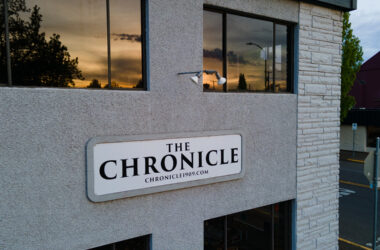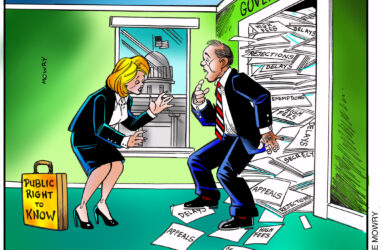It’s one of those early mornings, and I’m hoping my ablutions are uneventful. I pull my scleral contact lenses, insertion device, and lens solution, decide to open an additional bottle of solution (nothing like not enough saline to make lens insertion go horribly awry), and get to work.

My morning has barely begun, and I’ve already engaged in plastic – and fossil fuel – intensive practice.
My contacts are made of plastic. The glasses I wore to find my way to the bathroom are made of plastic, because at the thickness my prescription requires, glass is not an option. My lens solutions are housed in plastic, and since it was discovered that some eye solution preservatives were damaging people’s eyes, those bottles of preservative-free solution are now considerably smaller than they once were, thus requiring more bottles.
I am acutely conscious of how resource-heavy my ability to see is.
Kate and I have been aware of our use of resources for a while, and are also aware of some of the ironies and trade-offs that are a part of not wasting resources – like the huge plastic tanks in which we cache (legally) harvested rainwater off our roof and then use for our garden and have in reserve for fire. And the materials mined for our solar panels and batteries.
What has become alarming is that sound bites about climate action and activism act as if there are no trade-offs, as if those of us who are saying anything from “wait” to “no” to climate action proposals are morally lax obstructionists who hate the planet, or change, or both.
The elimination of plastic may seem a no-brainer unless you use, say, medical devices.
The elimination of gas-powered machinery may seem straightforward unless you have chosen to use gas because battery-powered tools caught fire from being overextended while doing fuels reduction (raises hand), or if your machinery couldn’t recharge in time to get the time-sensitive harvest work completed.
When we moved here, we were pretty sure we could tend our 40 acres with only hand tools. When we saw the damage from Snowmageddon, we allowed ourselves a battery-operated chainsaw; we rented a brush hog; we developed a little stable of battery-operated tools.
By now, after the Holiday Farm fire, the battery-operated tools are gone, replaced with gas tools we own, because those tools are up to the tasks we repeat frequently.
We’ve had to rethink almost all of our assumptions (my June 1, 2023 piece in The Chronicle) – and came to realize that our assumptions were based on a good-hearted, deep desire to help the planet – and a corresponding absence of any understanding of what actually caring for our piece of land would entail.
Caring about our land is easy, if fraught; caring for it is an intimate, rewarding, devastating, educational, arduous adventure that looks nothing like we imagined. Caring for our land is shaping our perceptions and perspectives.
Ironically, we find ourselves less enthusiastic about some actions dedicated to saving the planet because those very measures may render impossible caring for specific lives on the planet.
It’s understandable to look for quick solutions of unquestioned efficacy when faced with intractable dilemmas. If one action can have a huge impact, it is unquestionably attractive as a solution.
Inevitably, though, when we see that solution years down the line, we see the unanticipated, unintended consequences of those choices. (See Melinda Montgomery’s Aug. 24, 2023 Chronicle piece for an example.)
Solutions also look different from different vantage points.
Case in point: From my former perspective as a backpacker living in the urban core who cared deeply about the places we backpacked, the solution to forest care was clear – stop building roads into forests and cutting down trees.
From my current perspective of caring for (not just about) my woodland, forest care is much more complex and nuanced, and may require roads and cutting trees. In my urban reality, an all-electric city may not have been the best idea, but it was plausible (with disproportionate effects on the not-wealthy); in our woodland, even with solar power, propane is an essential backup.
If a changing climate is indeed an existential threat, it cannot be left to activism and soundbites to determine adequate solutions.
Solutions will be complex and multifaceted and nuanced (the very things sound bites are, by design, not) and will take into account the difference in rural and urban realities.
We will have to listen to one another: dwellers in urban and rural realities; large landowners and small landowners; landowners and renters; entities with the financial capacity to accommodate mandated changes and those entities who are one mandated change away from insolvency.
If we are not attentive to one another, we will, however unwittingly, leave behind swaths of destruction in our attempt to save the planet.
Theresa Hausser and her wife, Kate, owns and manages 39 acres of burned woodland in the footprint of the 2020 Holiday Farm Fire.






